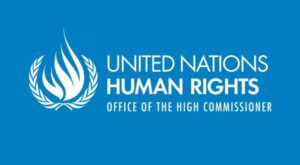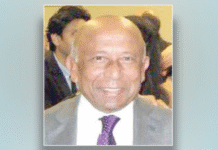 Tamanna Hoq Riti
Tamanna Hoq Riti
On November 13, Bangladesh’s human rights record was reviewed for the fourth time under the Universal Periodic Review (UPR), an important UN human rights mechanism. A high-powered government delegation, led by Law Minister Anisul Huq, represented the Government of Bangladesh on the review and presented the country’s progress in implementing previous recommendations. In his presentation, the law minister highlighted Bangladesh’s progress in ensuring economic, social, and cultural rights. He also mentioned the various legal policies and other initiatives the government has taken to protect human rights and constitutional rights. However, he did not adequately address existing human rights concerns or the allegations of various stakeholders. He mentioned that the government took initiatives in consultation with the CSOs and HRDs, even though adequate, effective, and meaningful engagement of CSOs in this process was absent.
The UPR process was launched in 2006. Bangladesh underwent its first review in 2009, its second in 2013, and its third review in 2018. The process is a four-and-a-half-yearly review of the human rights records of all UN member states by the Human Rights Council, during which member states make recommendations to the state under review on human rights issues. The UPR process has gained considerable acceptance from various states and stakeholders compared to other human rights mechanisms of the UN because it uses a peer review system.
The UPR review is based on three reports: a national report prepared by the government, a compilation prepared by the Office of the High Commissioner for Human Rights (based on various information from the UN), and another prepared by the OHCHR from reports submitted by the National Human Rights Commission and national and international human rights organisations or coalitions of organisations.
Member states make recommendations to the state under review. The state under review can highlight the initiatives taken by the government to improve the human rights situation, and support or note the recommendations made by other states. To “note” means that even if the government does not support these recommendations at the time, it will take necessary measures to create an environment for supporting them in the future.
For the fourth round of review, the government, the National Human Rights Commission, and national and international human rights organisations or coalitions of organisations submitted reports. These reports were uploaded to the website of the UN’s OHCHR two weeks before the review.
It is worth mentioning that this time, 39 stakeholder reports have been received from various national and international human rights organisations or coalitions of organisations. In addition, countries such as Belgium, the United States, the United Kingdom, Germany, Canada, Sweden, and Uruguay have already submitted their questions, focusing on issues such as the ratification of the UN Convention on Enforced Disappearances, prevention of child marriage, the creation of a conducive environment for human rights defenders and civil society organisations, and the guarantee of the right to peaceful assembly. The law minister responded to these questions during the interactive dialogue.
In 2007, the Human Rights Forum Bangladesh (HRFB) was formed, consisting of 20 human rights and development organisations to use this process to improve the human rights situation at the national level. For the fourth round, the forum also prepared a report in consultation with various stakeholders and submitted it to the UN Human Rights Council. Before submitting this report, the forum shared the draft with the relevant ministries and national institutions. As in previous reviews, a delegation from the forum was present in Geneva during Bangladesh’s review.
Bangladesh’s current political situation is conflict-ridden, with clashes and violence occurring at rival political parties’ events. There have also been allegations of mass arrests or arrests of opposition party leaders and activists, and people live in fear and insecurity. The scope for freedom of expression is shrinking, and there are increasing allegations that the right to peaceful assembly is being obstructed.
In response to widespread criticism, the government repealed the Digital Security Act, 2018 and enacted the Cyber Security Act, 2023. However, the new law also provides opportunities to curtail the right to freedom of expression and freedom of the media. Critics allege that the only change is the name of the law, and that the basic character and provisions of the law have remained largely the same. Additionally, the government has repeatedly pledged to enact an anti-discrimination law, but the bill on this issue has not yet been finalised.
In the latest UPR, the Bangladesh government faced a variety of questions on issues such as the rights of marginalised groups (including women, children, people with disabilities, ethnic minorities, and sexual minorities); institutional ineffectiveness; the possibility of depriving people of their rights through surveillance-centric laws, especially laws that restrict the media, freedom of speech, and the right to organise; the deprivation of labour rights; and the absence of a level playing field in terms of voting rights.
The summary of the UN stakeholders’ report raised the following issues: government influence on state institutions; the opaque membership recruitment process of the National Human Rights Commission and its inconsistency with the Paris Principles; the denial of extrajudicial killings, enforced disappearances, and torture allegations, or the failure to provide adequate assurances of necessary measures or accountability in the context of these allegations; and allegations of harassment of civil society organisations, human rights activists, and journalists.
In addition, the stakeholders recommended forming a separate department to protect the rights of children, amending the Child Marriage Prevention Act, 2017, enacting a Witness Protection Act, ensuring prompt, impartial investigations and punishments in cases of attacks on religious minorities, taking measures to protect the rights of Dalits and other deprived communities, fully implementing the Chittagong Hill Tracts Agreement, and strengthening the monitoring of recruiting agencies to protect the rights of migrant workers.
On the other hand, the government’s national report states that it has taken various initiatives or measures to implement the 178 recommendations adopted during the third UPR. However, there is much debate over whether the initiatives mentioned in the national report are adequate or effective.
The Bangladesh government’s position in response to various recommendations will be adopted as a draft outcome document on November 16. However, the government will have until March 2024—the next session of the Human Rights Council—to provide its final opinion. The forum expects and calls on the government to abandon its tendency to deny or avoid addressing human rights concerns, to carefully analyse each question and recommendation, and to make specific commitments for the next four-and-a-half years by adopting these recommendations. At the same time, the government should immediately establish a national planning and monitoring system with the relevant ministries, the United Nations, and civil society organisations to implement these commitments.
Tamanna Hoq Riti is a coordinator at Ain o Salish Kendra (ASK) and at Human Rights Forum Bangladesh (HRFB).
Daily Star









